Parenting Isn’t Easy—But Faith Might Help a Little
Religion does seem to have a (small) positive impact on parenting
This post has been unlocked through a generous grant from the Lilly Endowment for the Association of Religion Data Archives (ARDA). The graphs you see here use data that is publicly available for download and analysis through link(s) provided in the text below.
As you may have heard, the United States is facing a looming fertility crisis. Put simply, Americans are having fewer children. The total fertility rate (TFR) in the United States is currently 1.6 children per woman. For comparison, it was 3.6 during the height of the Baby Boom. And this phenomenon is not just relegated to the United States, most advanced countries are experiencing something similar. In China, the TFR is down to 1. For comparison, a TFR of 2.1 is considered to be necessary to just maintain a country’s population. In Sweden it’s 1.4, and the Spanish fertility rate is 1.2. South Korea may have the lowest fertility rate on the planet right now – just .8 children per woman.
Of course, this could lead to all kinds of issues in the future with a primary concern being how these nations will fund their generous social safety net programs for senior citizens. Lots of experts have weighed in on possible policy changes that could boost overall fertility, but the general consensus that emerges from these experiments is that it's going to be tough to meaningfully increase fertility.
Those at the Institute for Family Studies suggest religion may be a key factor, connecting the rise of the unaffiliated with declining birth rates among the nonreligious.
The Association of Religion Data Archives recently posted an interesting dataset from the Pew Research Center that asks what should be a central question in this debate -- do parents actually like being parents? There’s a lot of chatter on social media about how folks with children are just miserable, but are those examples just outliers? And, are religious parents more likely to express satisfaction with their lives than non-religious ones?
The American Trends Panel Wave 115 asked parents a battery of pretty straightforward questions with this prompt, “How often do you find being a parent to be…” Then they were given four adjectives: enjoyable, rewarding, stressful, and tiring. Here’s what the responses to those questions look like in the overall sample:
The clear impression that emerges from this data is that significant majorities of parents really do seem to enjoy having children: 83% find it enjoyable most or all of the time. In the entire sample just 1% chose the “rarely” or “never” option. So those horror stories you read on Reddit really are the edge cases. At the same time, about four in five parents find it to be a rewarding experience at least most of the time.
Now, that’s not to say that there aren’t challenges. When asked about stress - nearly 90% of parents said that they felt stressed at least some of the time. And nearly the same share said that it was tiring some of the time as well. But just 30% said that it was stressful most of the time and 42% said it was mostly tiring.
Overall, parents seem to really enjoy being parents. Sure, there are downsides, but it appears that despite the stress a clear majority of parents find it enjoyable and rewarding. It could be, though, that parental experience depends upon the age of the children. So what about parents with young children versus teenagers?
When it comes to the “enjoyable/rewarding” responses - things don’t change too terribly much. I think it’s fair to say that parents of kids 13-17 years old are finding a bit less joy in being a parent but it’s not a massive drop. However, you can clearly see a big difference on the bottom row. Parents of young children (0-4) are really stressed and tired. Which, if you’ve had children you know exactly what that is like.
But notice how parents of teenagers are easily the most well rested and that parenting is less rewarding or enjoyable. So that’s a really mixed bag and I’m sure that parents of teenagers are nodding their heads while reading these results.
But does religion play a role in this at all? Are Protestant parents more satisfied than Catholic or non-religious parents?
I find it really interesting that Catholic parents were noticeably more likely to play up the positive aspects of parenting. Almost 90% of them found it to be enjoyable (about 5 points higher than Protestants and ten points higher than the non-religious). Also, around 80% of Christian parents said it was a rewarding experience, which was five points higher than the non-religious.
It should come as no surprise, then, that the nones were a bit more likely to report that being a parent was stressful most or all of the time. It was 31% of the nones compared to 26% of Catholics and 28% of Protestants. However, when asked about how tiring it was the nones scored no differently than the Protestants. Catholics were noticeably lower on this metric (44% vs 37%).
One reason as to why religion may make it slightly more enjoyable to be a parent is easier access to support. If you’ve ever been around a house of worship you know that the older members are often happy to watch a child for an hour or two. Many churches regularly offer free childcare so that parents can attend Bible study or just have a quick date night.
When it comes to enjoying the act of parenting, there is absolutely no difference in responses between those who attend services weekly and those who never attend. However, when it comes to the question of whether it’s a rewarding experience, it does look like never attenders score lower on this metric by about 6-7 points.
However, the trend lines for the questions about parenting being stressful or tiring are pretty unmistakable. The group that is most likely to find parenting often stressful are those who never attend religious services (33%). That’s 11 percentage points higher than regular attenders. On the question of whether parenting is tiring, only 37% of weekly attenders said this was common compared to 45% of those who never attend a house of worship.
I think that’s pretty decent evidence that being part of a faith community can have a small, but noticeable, impact on perceptions of parenting. I would not call this some kind of panacea to make parenting easier, but the data tells a clear story - church going parents feel less stress and fatigue than those who don’t attend a house of worship.
There’s another possibility here, too - social-desirability bias. If religious people are taught that children are a gift from God, then it logically follows that they would be less inclined to acknowledge the downsides of parenting. Of course, this is hard to parse because you can’t really track down survey participants and ask them if they were lying when they took the questionnaire.
Now, indulge me for a minute so I can test a hypothesis. Emile Durkheim is a foundational figure in social science, and his work Suicide tried to determine what factors led someone to end their life. One of his primary explanations was about religion. Specifically, Durkheim argued that Protestants have a more individualized view of life while Catholics tend to take a more communal approach.
Does that play out when it comes to parenting though? If Catholics really believe that “it takes a village to raise a child” then one could reasonably expect that Catholic parents would express a greater level of satisfaction than Protestants. Let’s see what the data says.
Yeah, that’s a big ol’ nothingburger. I can’t find a single comparison where there is a statistically significant difference between Catholics and Protestants. So, at least in this instance, there’s no evidence here that weekly attending Catholics are happier or less stressed than weekly attending Protestants.
But I do want to point out something that is clear as day in these findings - when Christian parents go to church they seem to be less stressed and not so tired. The differences are just huge - 30% of never attenders are stressed out most of the time. It’s 20% of weekly attenders. And there’s also a similar gap when it comes to fatigue. I think that really refutes the idea that church is just another thing to suck the energy out of parents.
But, I wanted to try and get right at the center of the question of whether religious parents tend to be more or less satisfied with their parental duties than non-religious parents. To understand that better I threw together a regression model where the dependent variable (the thing we are trying to predict) is whether someone says they enjoy parenting “some of the time”, “rarely” or “never.” It's a good proxy for how much they actually like that aspect of their lives - but remember that only 17% of the sample chose those options.
I controlled for several relevant factors that could impact parental satisfaction - income, age, gender, marital status, education, along with religious attendance and even political partisanship. When I hold that stuff constant, here’s the impact that religious affiliation (or lack thereof) has on parental satisfaction.
The model predicts that about 20% of the non-religious sample will say that they find parenting enjoyable some of the time or less. For religious respondents, it predicts the same response 17.7% of the time. Now, that difference is statistically significant but I would not say it’s a huge chasm. I mean, imagine someone trying to sell you on religion by saying it will make you 2.5 points more likely to say parenting is enjoyable. Would that be a convincing argument? Probably not.
That’s one thing that emerged from all the modeling I did behind the scenes but didn’t put in the post - there are a couple of factors that may increase or decrease parental satisfaction, but their effects are incredibly small. There is no real ‘magic bullet’ when it comes to making parents like their job more.
Which, from a policy perspective, is a real head scratcher. I will leave you with this sobering stat - folks were asked if parenting was easier or harder than they thought it would be. About 62% said it was harder than they would have guessed and only 7.5% said it was easier.
Yet most–religious or not–still find it to be an incredibly enjoyable experience.
Code for this post can be found here.
Ryan P. Burge is a professor of practice at the Danforth Center on Religion and Politics at Washington University.




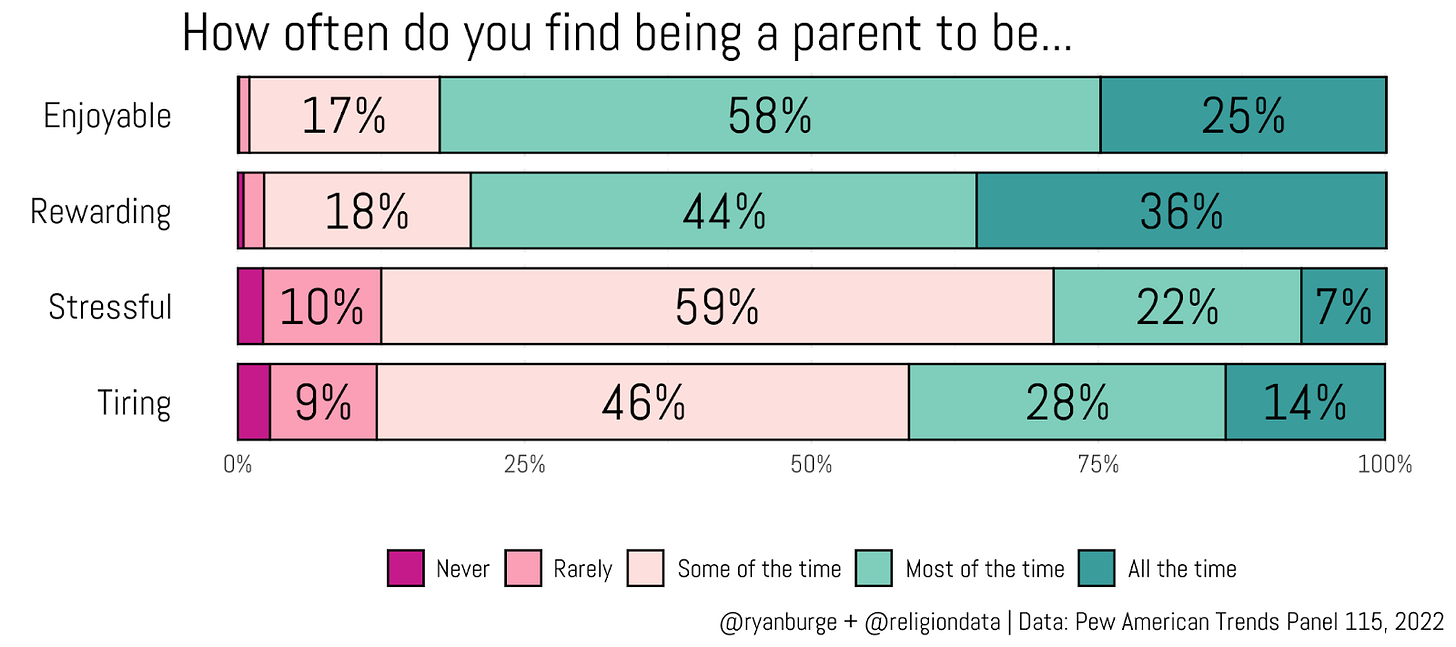
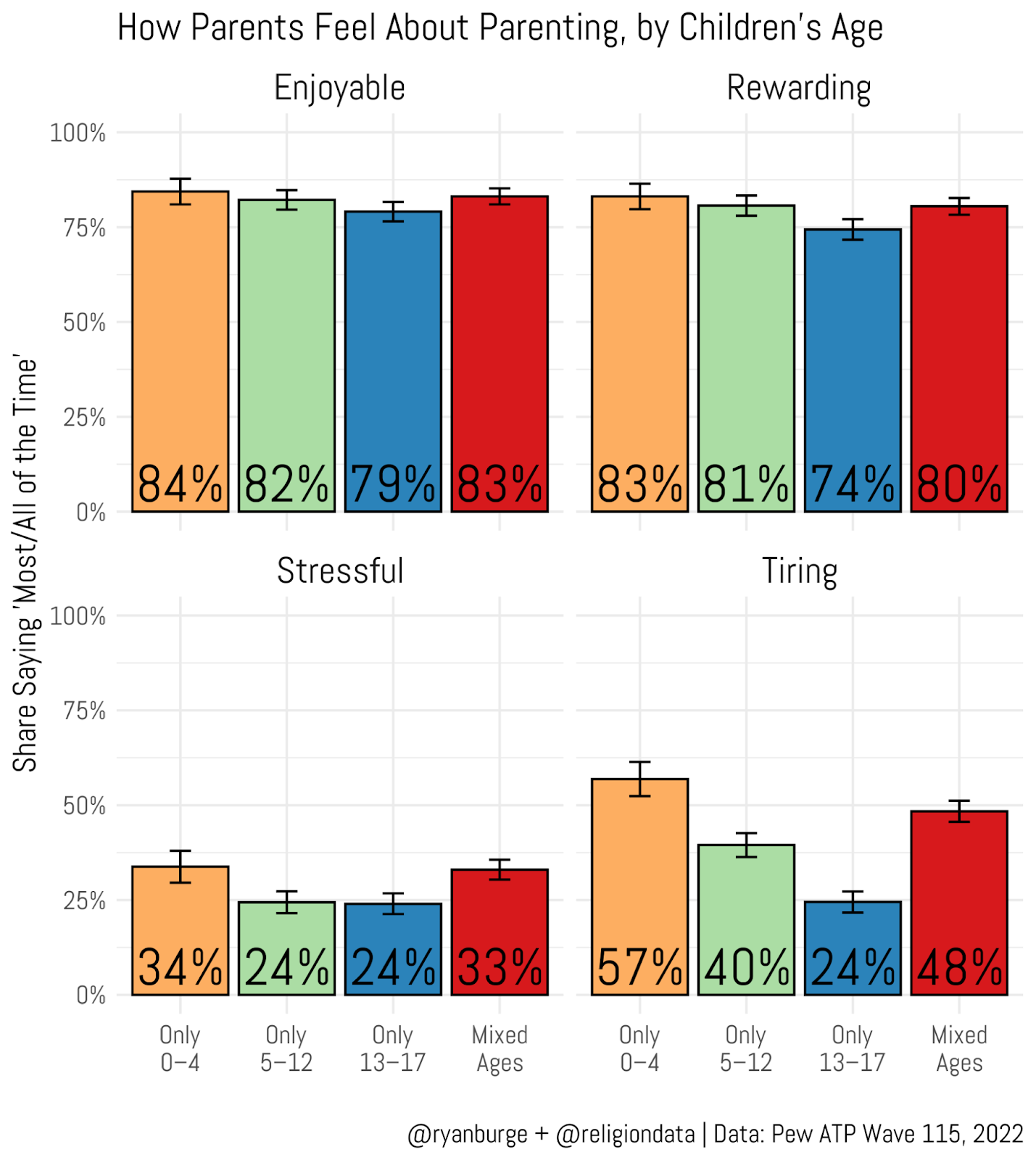
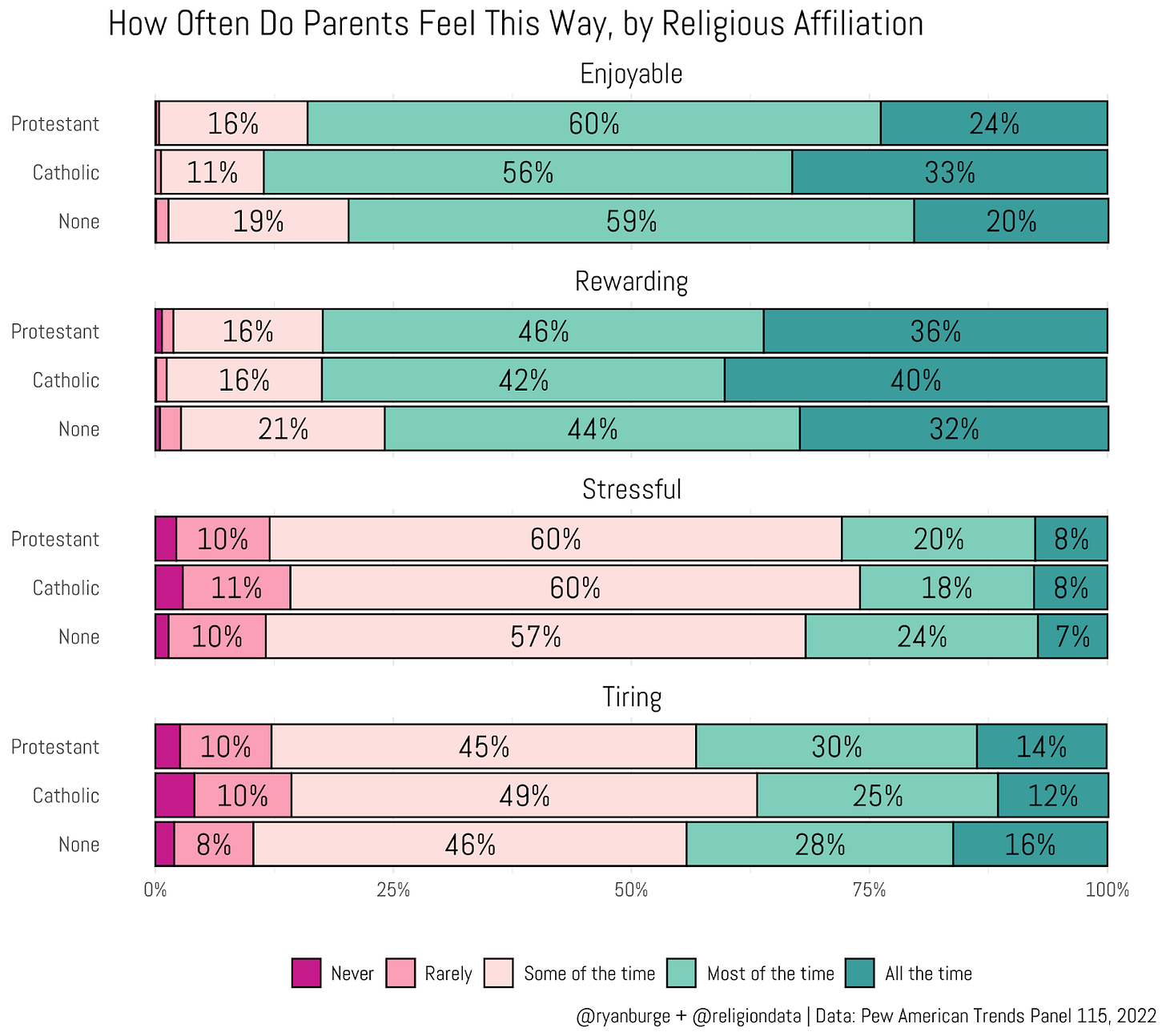
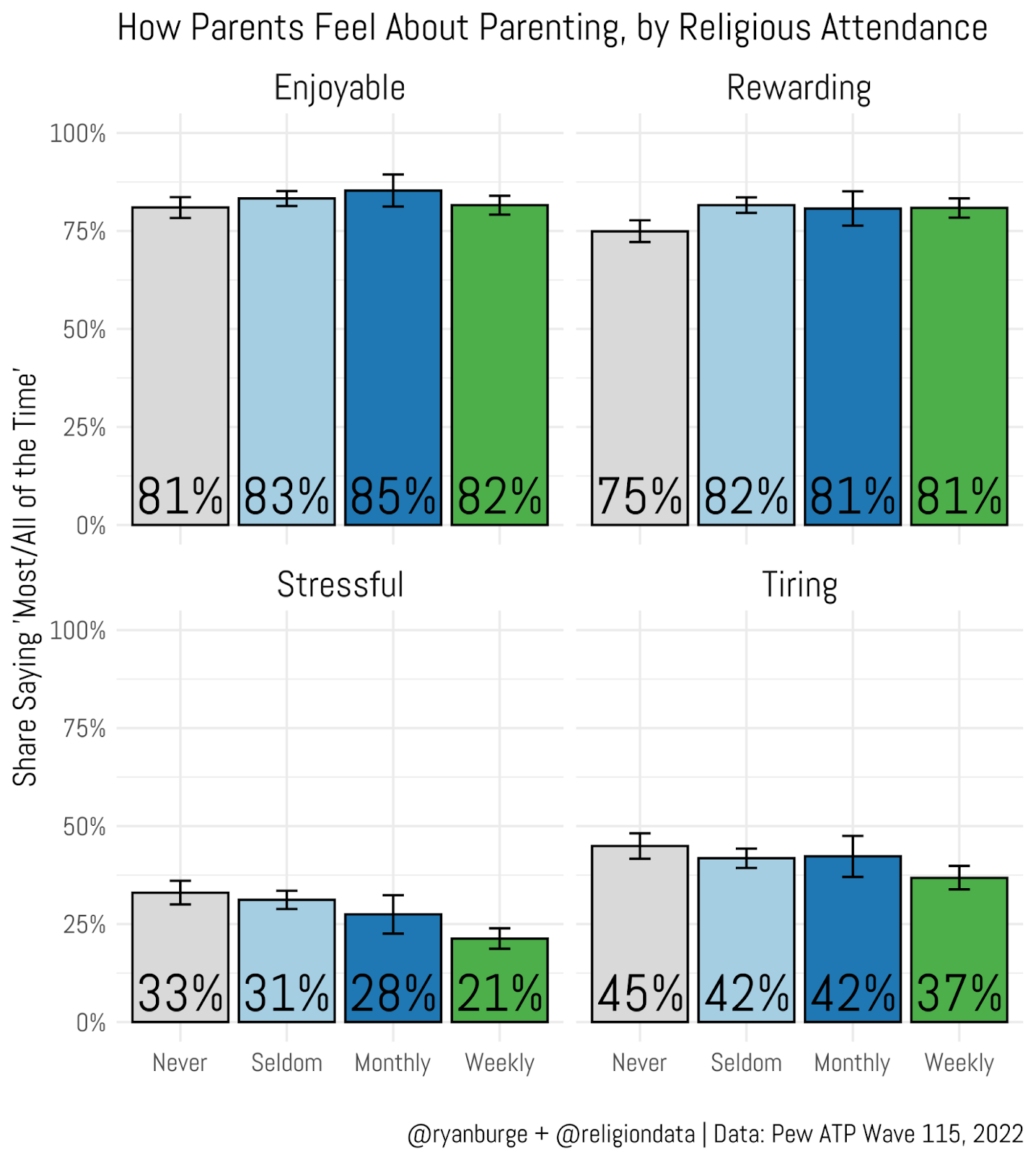
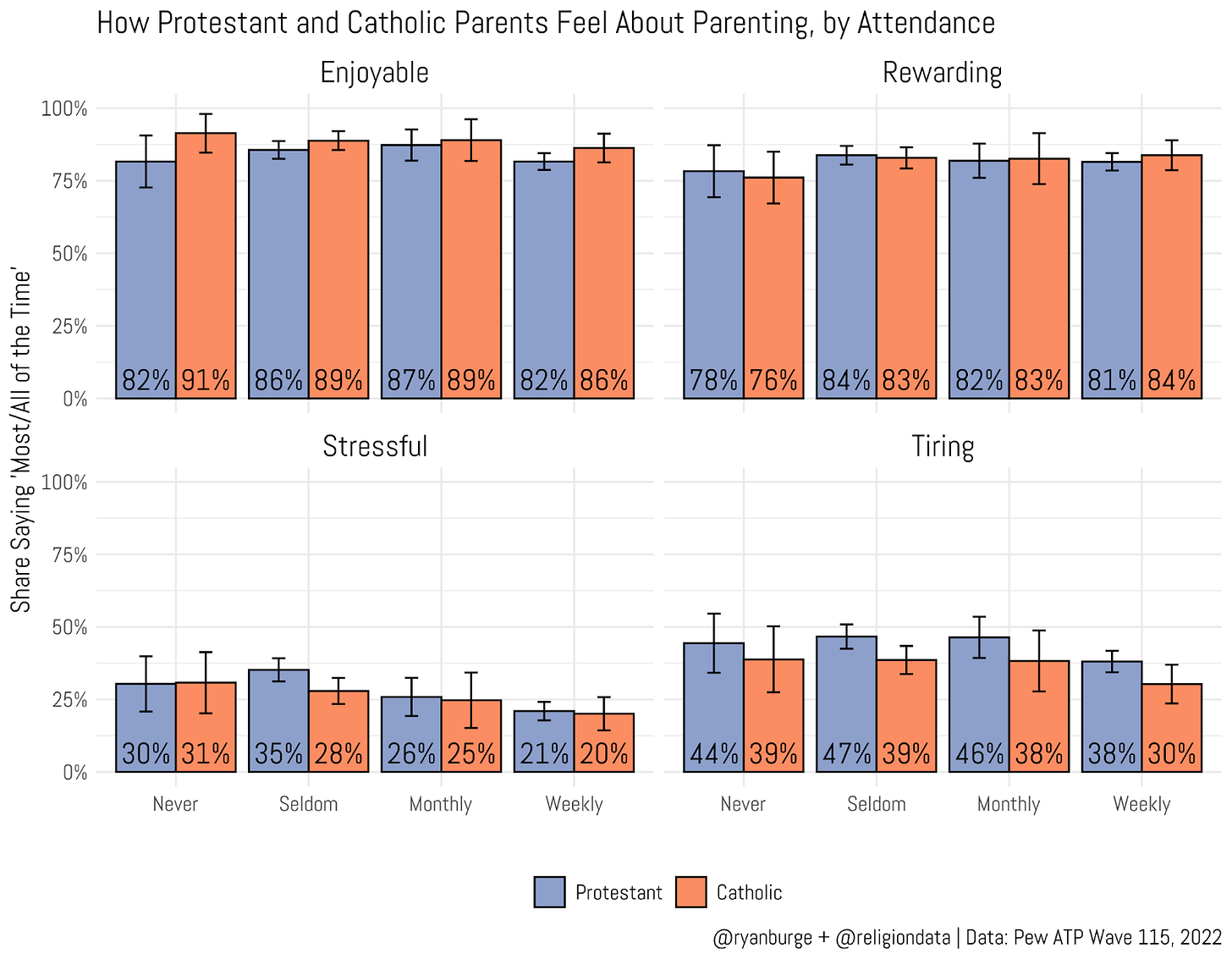
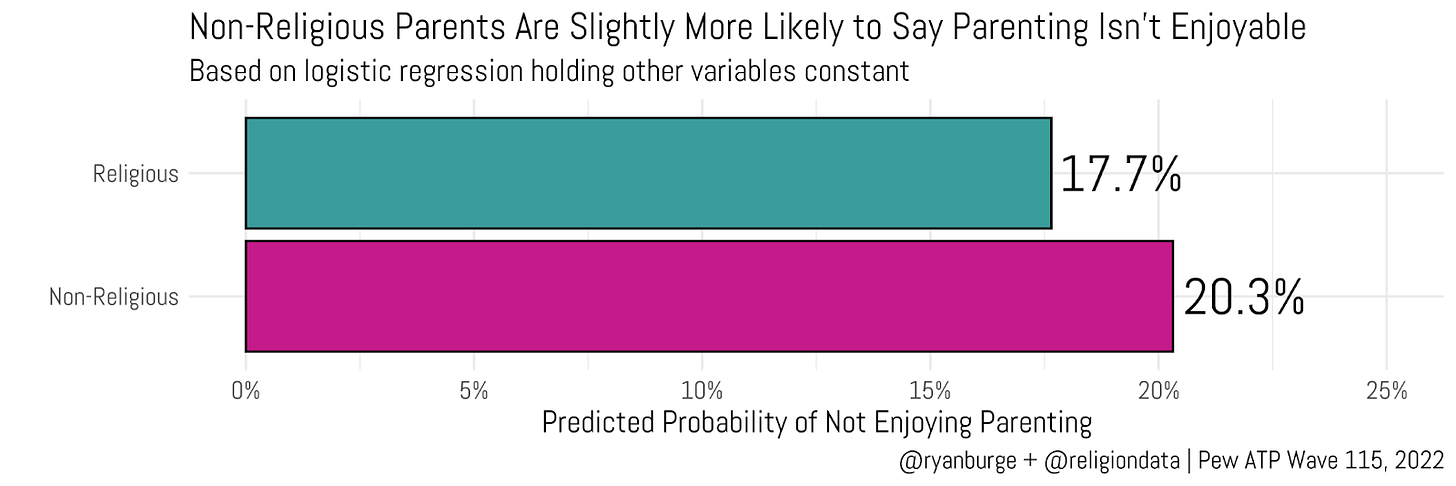

It's obviously impossible to hypothesise on questions-not-asked but what feels like the huge missing data here is about levels of support from family, friends and community. Regardless of age, race, political leaning, etc how stressed parents are going to feel is likely to be highly correlated to the quality of their support network, whether that's through a faith organisation or just a solid group of local friends.
“when Christian parents go to church they seem to be less stressed and not so tired.”
It’s also easier to get to church during the stretches when there’s a little more gas in the tank. I wonder how much selection effect are at work?
(Anecdotally, they’re at work on me. For me, some of that’s whether my access to what’s supposed to be standard medical care these days is secure. When it’s not, my churchgoing is likely to be significantly interrupted sooner or later.)